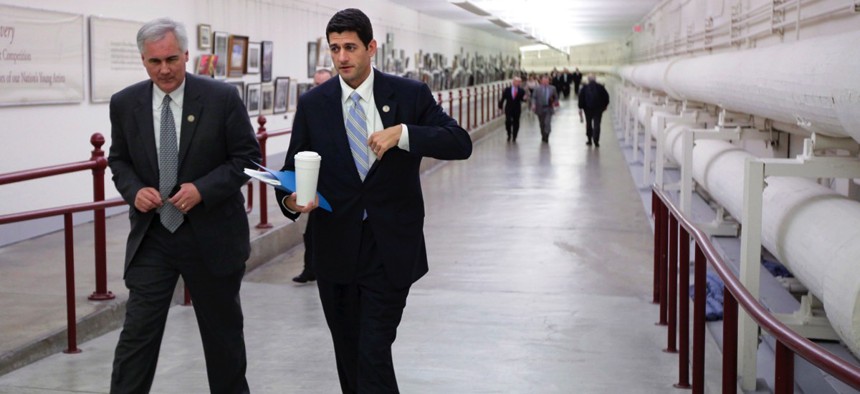Chafing Over Federal Land Control On Display As County Leaders Visit Capitol Hill

U.S. Rep. Tom McClintock, R-California, left, walks with House Speaker Paul Ryan, R-Wisconsin, right. J. Scott Applewhite / AP Photo

Connecting state and local government leaders
County officials came to Washington, D.C. to discuss a federal program that provides payments to localities for tax-exempt public lands. Some GOP members of Congress highlighted broader issues on Thursday.
WASHINGTON — Qualms about the federal government’s ownership of public land, mostly in the western United States, peppered remarks Republican members of Congress delivered at an event here Thursday that was put on by an organization representing counties.
County officials from around the nation visited Capitol Hill to impress upon congressional lawmakers the importance of the Payments in Lieu of Taxes, or PILT, program. Under that program the federal government makes annual payments to counties that encompass federal public lands—acreage that is exempt from local property taxes.
In 2016, counties received $452 million through the program, according to the National Association of Counties, which sponsored Thursday’s event. But going forward, county leaders would like to see more than another annual allotment of PILT.
They’d prefer that PILT funding become mandatory. The program is currently discretionary and subject to the yearly turmoil of the congressional appropriations process. Mandatory funding would provide greater certainty for counties as they budget and plan.
County officials made a similar visit to Washington last year as the fiscal year approached its Sept. 30 end date, promoting PILT to members of Congress and advocating for mandatory funding.
But while PILT was the main focus of Thursday’s event, several congressional lawmakers who were on hand see a broader issue reflected in the program. In their view: the U.S. government owns too much public land, some of which could be better managed by state and local authorities.
“When we talk about PILT funding, we need to constantly bear in mind that it is still a very, very poor substitute for revenues that are generated locally by healthy economic activity,” said U.S. Rep. Tom McClintock, a California Republican, who is a senior member of the House Natural Resources Committee and the chairman of the Subcommittee on Federal Lands.
Since the U.S. began setting aside public land, he said, the federal government had become “indiscriminate and voracious in the amount of land under its direct control.”
After describing what he sees as the mismanagement of forests in the Sierra Nevada region where his district is located, and chalking it up to cumbersome environmental restrictions, McClintock told county leaders: “We can’t take care of the land that we have, and your communities are stuck with an inattentive and incompetent landlord.”
U.S. Rep. Rob Bishop, a Utah Republican who chairs the House Committee on Natural Resources, also offered a critical perspective on federal land ownership.
“The fact that there is PILT in the first place is an indication of the failure of our system,” he said.
“The federal government has always been unable to manage lands thousands of miles away from where they are,” Bishop added.
Debates about the control of public lands tend to be thorny.
Bishop, along with fellow Utah Republican U.S. Rep. Jason Chaffetz, introduced a package of legislation in July that had been crafted with the aim of resolving long-standing issues related to public lands development and protection in the state. But the lawmakers were also angling to block President Barack Obama from creating the Bears Ears National Monument in San Juan County.
Conservation groups swiftly blasted the legislation.
“The intent of Rep. Bishop’s bill is simple: abandon our public lands to indiscriminate abuse by the oil and gas industry,” Sharon Buccino, director of the land and wildlife program at the Natural Resources Defense Council, said in a statement at the time. “It would open up this iconic Utah landscape to coal mining, tar sands, oil shale, and oil and gas development.”
Similar tensions exist elsewhere but center on issues tied to logging or ranching. And in one instance earlier this year, they turned extreme when an armed group took over a national wildlife refuge in Oregon. Members of the group voiced grievances over what they saw as unjust federal land policies. A trial for seven of the occupiers began in Portland, Oregon on Wednesday.
Upwards of 80 and 90 percent of the land in some counties in the western United States is federal.
Even in places where that percentage is smaller, it can take a substantial bite out of the property that is available to generate tax revenues. This can be tough for counties with tight budgets, especially when they need to provide services like law enforcement and road maintenance across vast areas.
Doug Breidenthal is president of the National Association of Counties Western Interstate Region and a commissioner in Jackson County, Oregon. Situated on the state border with California, the county encompasses the cities of Medford and Ashland, and Breidenthal said it has about the same landmass as Connecticut, with an area equal to the size of Rhode Island consisting of public lands.
In other Oregon counties where public lands have a sizable footprint, Breidenthal explained that financial pressures are mounting, which is why, he said, guaranteeing funding for PILT and another federal program, known as Secure Rural Schools, is crucial.
“I have one county that’s ready to go bankrupt,” Breidenthal said. “My neighboring county, there’s 911 calls that go unanswered.”
U.S. Sen. Jeff Flake, an Arizona Republican, also made remarks on Thursday.
“The optimum thing would be for the federal government not to have so much land,” he said. “But if the federal government does, then they’ve got to make sure that PILT is there.”
PREVIOUSLY on Route Fifty:
Bill Lucia is a Reporter at Government Executive's Route Fifty and is based in Washington D.C.

NEXT STORY: Connecticut's School System is So Bad, a Judge Has Declared the Whole Thing Unconstitutional





